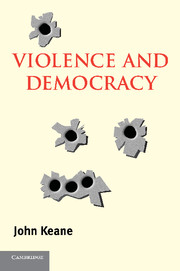5 - Why violence?
Published online by Cambridge University Press: 24 May 2010
Summary
The exercise of violence cannot be avoided when conflicting interests are at stake.
Sigmund Freud (1932)THE ROOTS OF INCIVILITY
The contributions of constitutional initiatives and civilian peace efforts to the vast project of democratising the means of governmental violence are important. In the age of triangulated violence, they warn against defeatism by forcing us to rethink the old objection that democracy always degenerates into violence. One of the first versions of that celebrated dogma appeared in the eighth book of Plato's Republic, where democracy is described not as the government of the people but of the poor against the rich. The guiding principle of democracy is said to be liberty, which is quickly transformed into licence due to democrats' lack of public and private restraint. Such licentiousness of the people is reinforced by their indulgence of superfluous needs and immodest desires, their lack of respect for law and their general tendency to question authority, so that the old condescend to the young, parents fear their children, ‘the master fears and flatters his scholars and the scholars despise their masters and tutors’. Polybius repeated this later famous line of attack:
For the people, having grown accustomed to feed at the expense of others and to depend for their livelihood on the property of others, as soon as they find a leader who is enterprising but is excluded from the honours of office by his penury, institute the rule of violence; and now uniting their forces massacre, banish, and plunder, until they degenerate again into perfect savages and find once more a master and monarch.
- Type
- Chapter
- Information
- Violence and Democracy , pp. 89 - 108Publisher: Cambridge University PressPrint publication year: 2004



